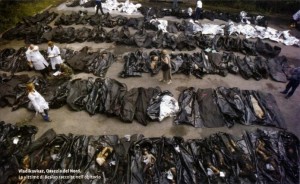In one of my posts on the aftermath of 9/11, I introduced the metaphor of the Attrition Mill. An attrition mill consists of two steel disks, rotating at high speed in opposite directions and crushing the substance to be milled between them. Metaphorically, I see America, and western civilization in general, as being caught in a gigantic attrition mill, with one rotating disk being the Islamofascist enemy and the other disk representing certain tendencies within our own societies…most notably, the focus on group identities, the growing hostility toward free speech, and the sharp decline of civilizational-self confidence.
The combination of the upper and lower disks of the metaphorical Attrition Mill is far more dangerous than either by itself would be. For example, the student government at the University of Minnesota has rejected a resolution calling for annual commemorations of the 9/11 atrocity. Why? It was argued that such a resolution would make Muslim students feel “unsafe.” The “Students for Justice for Palestine” said that being reminded of 9/11 on its anniversary would lead to increased “Islamaphobia.”
It seems pretty clear that this sort of ridiculously deferential “sensitivity” does not make immigrants, or children and grandchildren of immigrants, more likely to assimilate. Contrarily, it reinforces group identifies and intergroup hostilities. And in doing so, it creates a social environment in which it is much more likely that actual terrorists–representing the upper disk of the Attrition Mill–will go unreported or even be actively supported in their ethnic/religious communities. And that, in turn, greatly increases the risks inherent in large-scale migration.
Hillary Clinton reacted to the Benghazi murders by blaming a video, going so far as to tell a grieving father that he would have his revenge–not on the killers, oh, no, but rather we are going to have that filmmaker arrested . Here, we see the threat and actuality of Islamist violence being used as an excuse for interfering with the free-speech rights of Americans…and you can bet that if that precedent is successfully established, it will be applied with plenty of other justifications, too.
(On a related note, John Kerry came very close to saying that the attacks on Charlie Hebdo were in some manner justified.)
And both disks of the Attrition Mill are revolving with increasing speed. The attacks on Charlie Hebdo, the Paris kosher grocery store, and the Russian airliner were followed by the large-scale attack that just happened in Paris. The lower disk of the Mill is turning faster as well: Amherst students are demanding restrictions on free speech, with compulsory “reeducation” for offenders. We have seen insane behavior at Yale, with students raging at a couple of professors who dared to suggest that people not go overboard about the issue of Halloween costumes. Here is Alan Dershowitz on what is happening to our colleges: “the fog of Fascism is descending”


